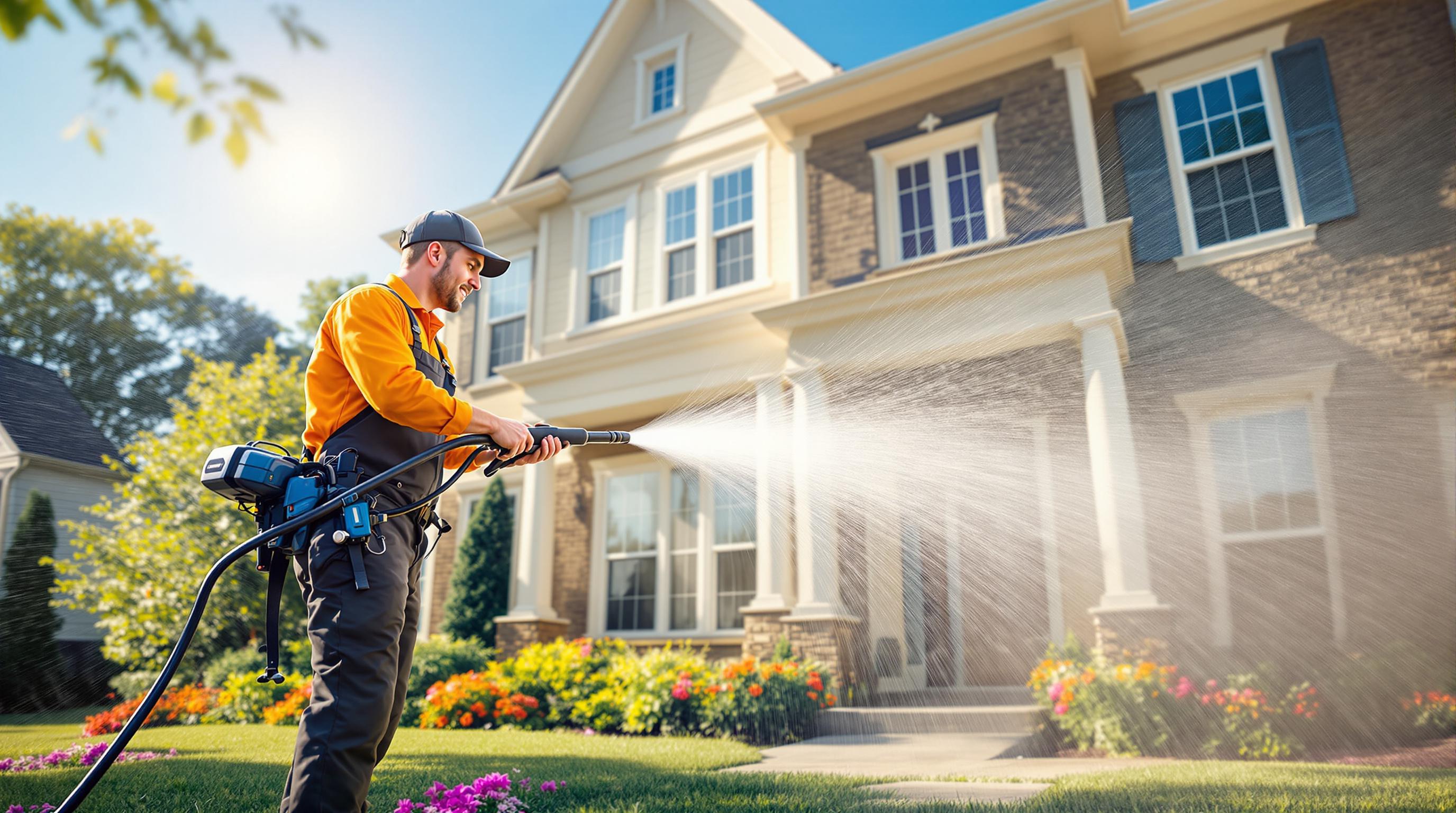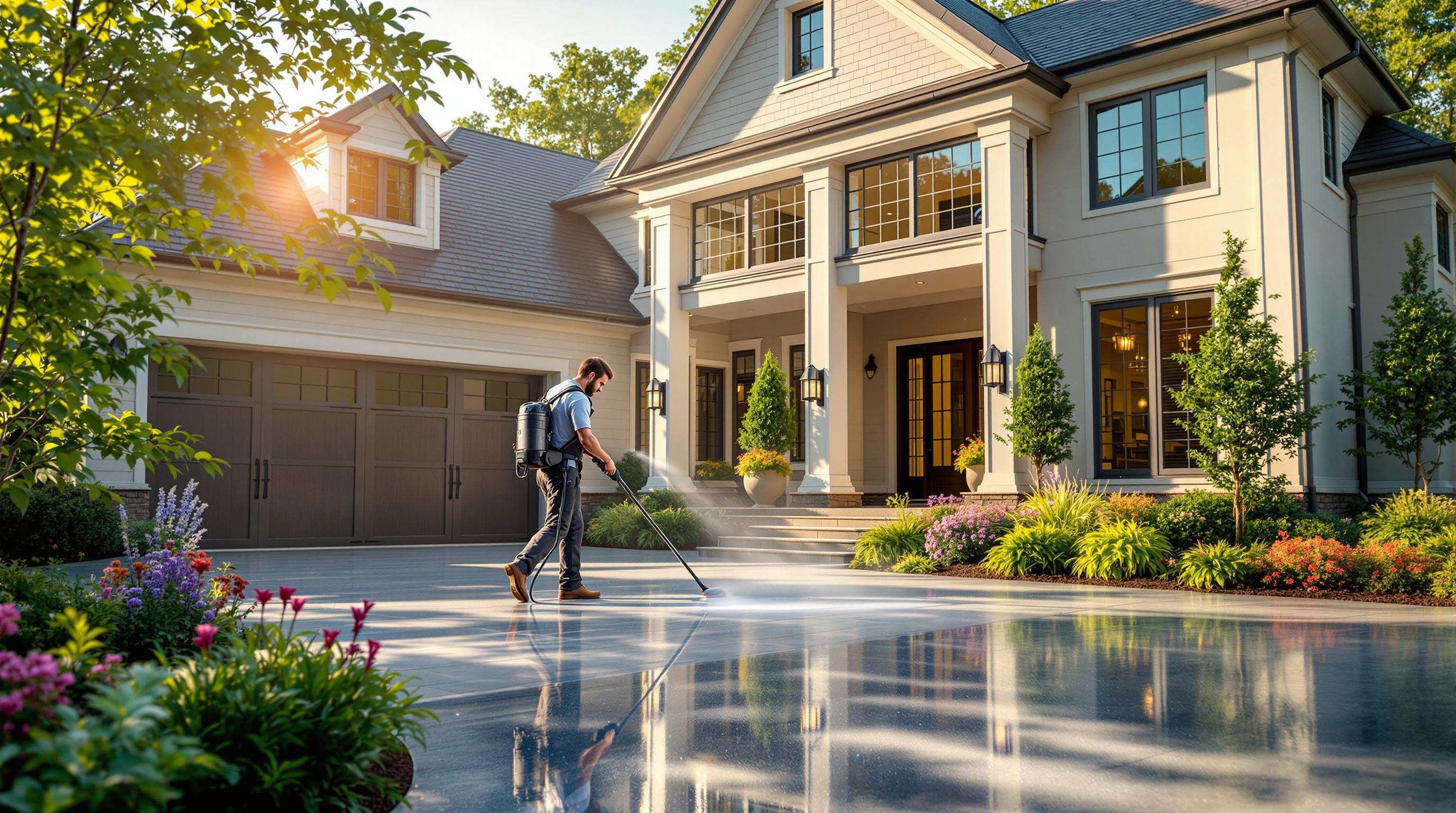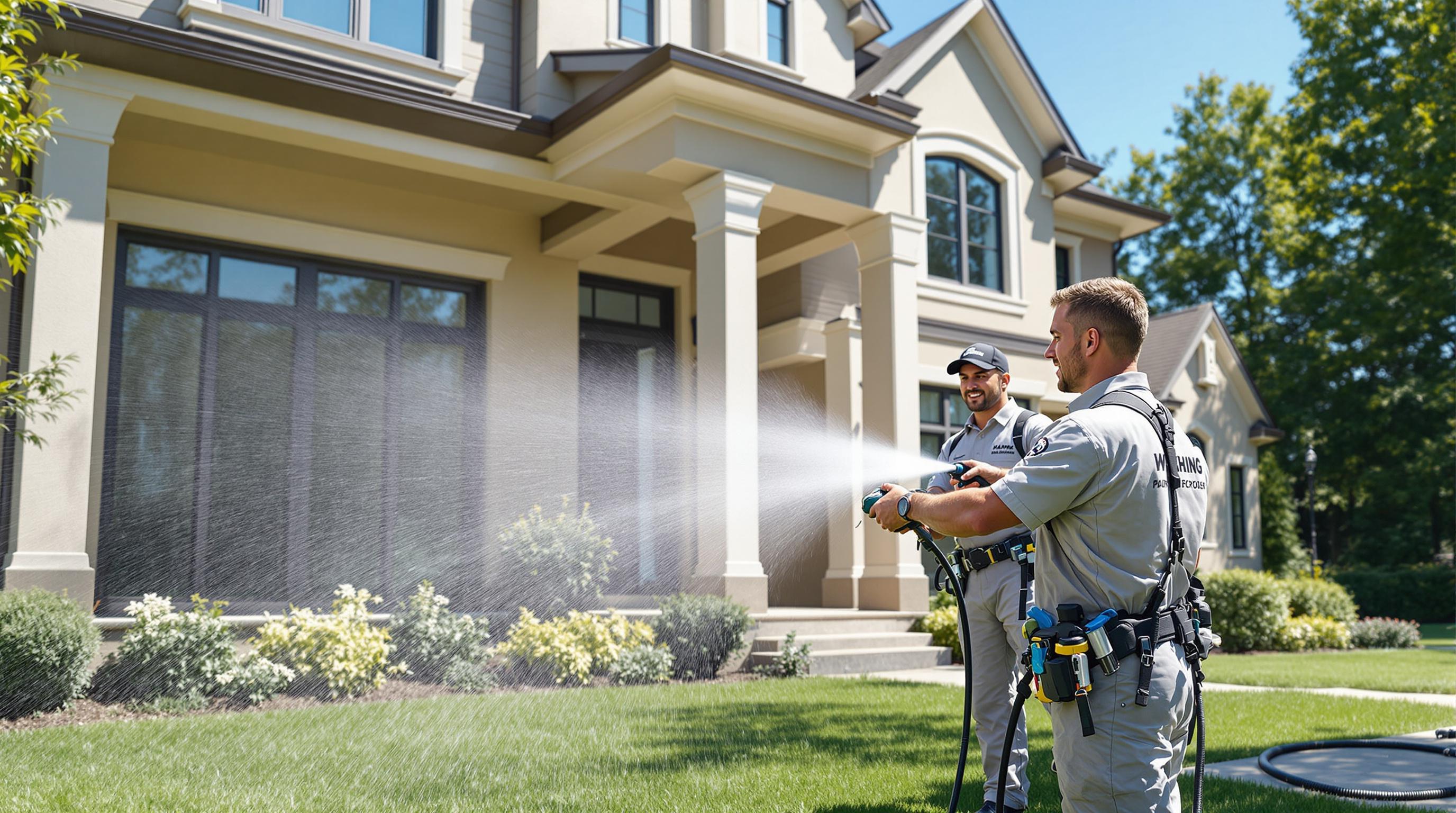Pressure washing can make your home look great and prevent long-term damage. But should you do it yourself or hire a professional? Here's a quick breakdown to help you decide:
- DIY Pros: Lower upfront cost, good for small projects, hands-on control.
- DIY Cons: Time-consuming, safety risks, potential for costly mistakes, lower-quality results.
- Professional Pros: Faster, safer, better equipment, expert techniques, and insurance protection.
- Professional Cons: Higher upfront cost (around $350 for a house wash).
Quick Comparison
| Factor | DIY | Professional |
|---|---|---|
| Cost | $160–$215/day | ~$350 per job |
| Time Required | 4–8 hours or more | 1–3 hours |
| Equipment Quality | Basic rental equipment | High-performance, commercial-grade |
| Safety | Higher risk, no insurance | Lower risk, insured and trained pros |
| Results | Decent for small tasks | Superior for tough stains and large areas |
For simple tasks like cleaning patio furniture or small driveways, DIY might work. For larger or more complex jobs, hiring a professional ensures better results and less hassle.
Hiring A Pressure Washing Company VS DIY | Immaculate ...
Cost Analysis
Let's break down both the upfront and long-term expenses of DIY pressure washing versus hiring professionals.
Initial Investment
Here’s what you can expect to spend upfront on DIY pressure washing:
| Expense Type | Typical Cost |
|---|---|
| Equipment Rental | $75–100/day |
| Basic Cleaning Solutions | $20–30 |
| Safety Equipment | $40–50 |
| Water Usage | $10–15 |
| Fuel for Washer | $15–20 |
| Total DIY Daily Cost | $160–215 |
In comparison, professional pressure washing services charge about $350 for a full house wash. This price includes the use of professional-grade equipment, cleaning solutions, and labor.
Additional Costs
DIY projects often come with unexpected expenses, such as:
- Maintenance for rented equipment
- Specialized cleaning solutions for tougher stains
- Higher water consumption
- Repairs if improper techniques cause damage
- The value of your time spent on the project
Cost Over Time
Looking beyond the initial costs, the long-term picture becomes clearer. Professional crews complete the job quickly, reducing the risk of damage. On the other hand, DIY efforts can lead to costly mistakes, like surface damage requiring repairs that might run into thousands of dollars. Professionals use advanced equipment that helps protect your property while ensuring a thorough clean.
Time Requirements
The time needed for pressure washing varies greatly depending on whether you do it yourself or hire professionals.
DIY Hours Needed
If you're taking the DIY route, here's how much time you can expect to spend:
- Equipment Setup: 1–2 hours
- Learning Techniques: 2–3 hours
- Cleaning a 1,000 sq ft home: 2–3 hours
- Cleaning a 2,000 sq ft home: 4–5 hours
- Cleaning a 4,000 sq ft home: 7–8 hours
- Cleanup: 1–2 hours
The type of surface also plays a role. For example, cleaning stucco may take an additional 2–4 hours compared to vinyl siding.
Professional Speed
Professional pressure washing teams get the job done much faster. Anthony Spena, Operations Manager at Perfect Power Wash, explains:
"Yes, the size of your home is one of the first things to consider when estimating how long it will take. However, we can't say that 10 extra square feet will add ten minutes to the job. It depends how dirty those extra feet are."
Here’s a general breakdown of their timing:
- Single-story home (2,000 sq ft): 1–3 hours
- Two-story home: 5–7 hours
This efficiency minimizes interruptions and saves a lot of time compared to DIY efforts.
Time Savings
Hiring professionals can save you hours, and here's why:
- No Setup Hassle: They bring their own equipment.
- Faster Cleaning: Their experience ensures quicker and more thorough results.
- Immediate Completion: What might take you days can be done in just a few hours.
- No Research Needed: Skip the time spent learning techniques and safety measures.
These time differences are a key factor when deciding between DIY and professional pressure washing.
sbb-itb-8e2a680
Safety Factors
Pressure washing comes with notable safety risks, which vary greatly between DIY efforts and hiring professionals.
Common DIY Mistakes
Many DIY enthusiasts overlook key safety measures, leading to injuries or property damage. Each year, thousands of people end up in emergency rooms due to pressure washer-related accidents. Here are some frequent mistakes:
- Applying too much pressure on fragile surfaces, which can strip paint or damage roof shingles.
- Using the wrong nozzle tips, especially the hazardous zero-degree (red) tips.
- Combining high-pressure equipment with unstable ladders.
- Skipping essential protective gear.
Professionals, on the other hand, are trained to handle these risks effectively with the right tools and techniques.
Professional Coverage
Unlike DIY approaches, professionals follow strict safety standards to prevent accidents. Here’s what sets them apart:
- Insurance Coverage: Protection against property damage and workplace accidents.
- Trained Technicians: Experts who know how to clean different surfaces without causing harm.
- Risk Assessments: Careful evaluation of surfaces before starting the job.
- Equipment Mastery: Proper use of pressure settings tailored to specific materials.
For instance, Pressure Washing Cary NC emphasizes safety by carrying full insurance and providing ongoing training to their technicians. Their team is skilled in the latest safety practices and equipment handling, ensuring a reliable and secure cleaning process. This commitment to safety often makes professional services a preferred choice over DIY methods.
Safety Equipment
Proper safety gear is a must for pressure washing. Below is a breakdown of commonly used protective equipment:
| Equipment Type | Professional Standard | Purpose |
|---|---|---|
| Eye Protection | Wraparound goggles/face shield | Shields eyes from water jets and flying debris. |
| Body Protection | Heavy-duty raincoat with hood | Guards against high-pressure sprays and chemicals. |
| Foot Protection | Rubber boots with metatarsal guards | Protects feet from water and falling objects. |
| Hand Protection | Rubber gloves | Prevents chemical burns and injuries. |
| Hearing Protection | Earplugs | Reduces noise from gas-powered equipment. |
Water jets exceeding 4,000 PSI can cause severe eye injuries. Professionals also use specialized tools and follow strict protocols for working on elevated surfaces, minimizing the risk of falls. This is especially critical for DIYers, as the recoil from pressure washer wands can make ladder use particularly dangerous.
Cleaning Results
The results of professional pressure washing often surpass what can be achieved through DIY efforts, thanks to better equipment and expertise.
Equipment Performance
Professional-grade pressure washing equipment delivers stronger cleaning power and greater versatility compared to consumer models.
| Feature | Professional Equipment | Consumer Equipment |
|---|---|---|
| PSI Capability | Much higher, for tougher tasks | Lower, for lighter cleaning |
| Usage Design | Built for heavy, continuous use | Designed for occasional use |
| Pressure Control | Multiple adjustable settings | Limited adjustment options |
| Cleaning Solutions | Can use stronger, commercial products | Limited to consumer-grade solutions |
| Coverage | Handles large areas efficiently | Smaller coverage, less reach |
These differences make professional equipment better suited for difficult cleaning scenarios and larger projects.
Difficult Stains
Professional services excel at removing tough stains like oil on concrete, mold, mildew, graffiti, and dirt trapped in porous surfaces. They use advanced tools and commercial-grade cleaners to tackle these issues effectively. Many also choose biodegradable and environmentally safe solutions, ensuring a thorough clean without harming the environment.
Surface Protection
Cleaning isn't just about stain removal - it's also about protecting the surfaces being cleaned. As Dave Trezza, a Test Engineer at Consumer Reports, explains:
"You might be inclined to pressure-wash just about everything around the house, but that's not always a great idea".
Professionals use careful techniques to avoid damage, such as:
- Pressure Calibration: Adjusting water pressure based on the material.
- Distance Control: Keeping the right distance to avoid surface damage.
- Specialized Nozzles: Choosing the right nozzle for each task.
- Pre-treatment: Applying cleaning solutions before washing.
According to Pressure Washing Cary NC, using the wrong pressure or chemicals can damage surfaces like siding or windows. Professionals understand how to balance cleaning power with care, especially on materials like wood decks, vinyl siding, and roof shingles. This expertise not only prevents DIY mistakes but can also boost your home's value by 2-5%.
Best Uses for Each Method
Deciding between DIY and hiring professionals depends on the complexity of the task. Simple jobs can often be tackled on your own, but more demanding projects are better left to experts.
Simple DIY Projects
DIY is ideal for straightforward cleaning tasks. Here's a quick guide to common projects and what to keep in mind:
| Project Type | Conditions | Tips to Remember |
|---|---|---|
| Patio Furniture | Small, accessible area | Stick to low-pressure settings |
| Garden Tools | Non-delicate items | Use the right cleaning solutions |
| Small Walkways | Flat, good condition | Be cautious of loose pavers |
| Single-car Driveways | Minimal staining | Avoid tackling oil-based stains |
| Ground-level Decking | Well-maintained wood | Test pressure on a hidden spot |
DIY is a budget-friendly option for quick, simple projects you can finish in a day.
When to Hire Pros
For more complicated tasks, professional services are the safer and more efficient choice. Consider hiring experts in these scenarios:
- Complex Surfaces: Multi-story buildings, delicate materials like aged brick, wood siding, or glass windows, and roof cleaning require specialized skills.
- Commercial Properties: Structures like mid-rise buildings, shopping centers, schools, or places of worship often demand the equipment and safety measures professionals provide.
- Tough Conditions: Heavy oil stains, graffiti removal, hard-to-reach spots, or even dumpster cleaning are challenges best handled by trained professionals.
Making Your Choice
When deciding between doing it yourself or hiring a professional, consider factors like project size, surface type, cost, time, safety, and potential damage.
Decision Checklist
Here’s a quick comparison to help you decide:
| Factor | DIY | Professional |
|---|---|---|
| Project Size | Small (under 1,000 sq ft, single-story) | Large (multi-story or over 1,000 sq ft) |
| Surface Type | Concrete, basic pavers | Delicate materials, wood siding, roofs |
| Equipment Cost | $50–$250 per day rental | Service cost (around $350) |
| Time Investment | 4–8 hours for smaller projects | 1–3 hours for most jobs |
| Safety Risk | Higher, especially for elevated work | Lower, handled by insured pros |
| Potential Damage | Repairs could cost up to $900 | Professional guarantee included |
"Getting on ladders is dangerous if you're not trained and used to it. If you need to pressure wash anything high up, consider letting a pro handle the job."
– Fred Hodge, President and Co-Founder at Clearview Washing
If the project feels too complex or risky, hiring professionals might be the smarter choice.
Professional Services
Here’s what you can expect when you opt for professional pressure washing:
- Expert Assessment: Skilled technicians assess surfaces and adjust pressure settings accordingly.
- Specialized Equipment: Industrial-grade machines, some with up to 4,000 PSI, ensure precision and efficiency.
- Custom Solutions: Cleaning agents tailored to specific surfaces for optimal results.
- Versatility: Handles a wide range of surfaces, from driveways to delicate siding.
- Insurance Coverage: Protects your property from any mishaps.
According to Consumer Reports, combining professional pressure washing with minor paint touch-ups can boost your home’s value by 2–5%. When dealing with sensitive materials or large projects, professionals deliver thorough cleaning while safeguarding your property.


